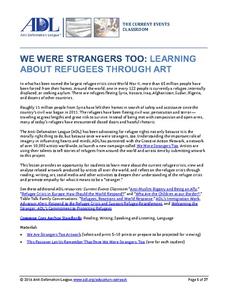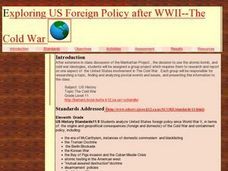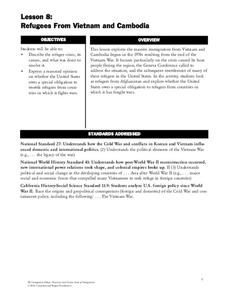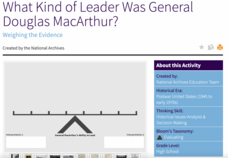Curated OER
My Secret War: Lesson 8
Fifth graders explore American history by viewing videos on the Internet. In this Japanese internment lesson plan, 5th graders discuss the politics that took place between America and Japan during WWII and why it was necessary to...
Curated OER
Civil Rights and Casualties of Wartime
Do your historians fully grasp the consequences of being at war? Help them connect past with present through this group research activity, which has learners analysing repercussions suffered by citizens of countries in conflict. Students...
Curated OER
The U. S. at War
High schoolers examine reasons for going to war. For this foreign policy lesson, students analyze the reasons the U.S. entered the the War of 1812, the Mexican War, the Spanish-American War, World War I, World War II, the Korean War, the...
Facing History and Ourselves
Justice After the Holocaust
Though there could be no true justice for the horrors of the Holocaust, many of those responsible for crimes against humanity were found guilty in the eyes of the law. Using primary and secondary sources in the 16th installment of a...
Anti-Defamation League
We Were Strangers Too: Learning About Refugees Through Art
Did you know that "in the largest refugee crisis since World War II, more the 64 million people have been forced from their homes"? The Anti-Defamation League presents an activity that asks class members to examine a series of artworks...
Curated OER
Who Was Responsible for the Start of the Cold War?
Young scholars determine who is responsible for the start of the Cold War. In this Cold War lesson plan, students conduct their own research about the evolution of the war and write essays that reveal their opinion on how the war began.
Japan Society
Japan in the World Since 1945
What have US-Japanese relations been like since the conclusion of World War II? Why do some commentators identify Japan's postwar years as a subordinate independence? Invite your young historians to research Japan's status in the world...
Curated OER
Exploring US Foreign Policy after WWII--The Cold War
Scholars explore U.S. Foreign Policy and Cold War ideologies adopted after WWII. They conduct Internet research on a topic or issue related to the Cold War Era, watch two films, and compose a time line and a multimedia presentation to...
Curated OER
Current Connections
Many of us read our history books and take each word as truth. Show learners that history can easily be altered depending on who writes it. Your class will watch a series of videos, read a first person testimony, and discuss the...
Curated OER
Total War
Students view a video about the result of using atomic weapons during World War II. They examine how human rights are violated during wartime. They listen as family members come and speak to the class about their experiences during the...
Curated OER
Japanese Internment During World War II
Students identify, describe and discuss the reasons why Japanese-Americans were placed in internment camps and what life was like at these camps. Then they write an unsent letter to a family member on the East Coast describing their...
Curated OER
Propaganda
Students discuss wartime propaganda after viewing the World War II film "Christmas Under Fire." They answer discussion questions, identify passages of propaganda from a transcript of the film, and write a brief from the Ministry of...
Spark Notes
The Interwar Years (1919-1938): Study Questions
In this online interactive history worksheet, students respond to 10 short answer and essay questions about years between World Wars I and II.
Curated OER
Never To Forget
Tenth graders discuss the events leading up to antisemitic behavior in Europe during World War II. Through various activities, 10th graders acquaint themselves with the political ideology of Nazism and assess responsibility for the...
Echoes & Reflections
Nazi Germany
The Holocaust was an evolution of anti-Semitism, scapegoating, and targeted violence against Jews with Nazi policies. A resource unpacks the escalation in violence, along with the erosion of democratic institutions, during the 1930s....
Bill of Rights Institute
Post-WWII Boom: Transition to a Consumer Economy
The war is over! Scholars investigate an AP review video to uncover the post-WWII era in the United States. Viewers examine and analyze the consumerism that arose in post-war America. This is the eighth installment of a nine-part...
Constitutional Rights Foundation
Refugees From Vietnam and Cambodia
The United States may have pulled its troops from the Vietnam War in 1973, but the conflict was far from over for the citizens living in Asia at the time. An informative resource lets learners know about the wave of over 220,000...
Echoes & Reflections
The "Final Solution"
Nazi policies shifted from deportation and imprisonment to extermination of the Jewish people in death camps in the "Final Solution." Learners examine photos of artifacts, read poetry written by survivors, analyze testimony from...
Echoes & Reflections
Studying The Holocaust
While many young scholars are familiar with the Holocaust, they may not understand the specific history that led to the unprecedented atrocity. The first lesson in the unit helps teachers gauge their pupils' background knowledge. A...
Echoes & Reflections
Timeline of the Holocaust
An interactive timeline uses images, videos, primary source documents, and links to informational text to chronicle the history of the Holocaust from 1933-1945.
DocsTeach
What Kind of Leader Was General Douglas MacArthur?
For five decades, General Douglas MacArthur shaped US military involvement around the world. His career ended when he went toe to toe with President Dwight Eisenhower over the Korean War. Young historians evaluate the complicated command...
DocsTeach
Analyzing Einstein's Citizenship Application
Albert Einstein contributed greatly to America's history, but he wasn't always a citizen. An engaging activity analyzes Einstein's citizenship application to understand the process of immigration and how it impacts those trying to reach...
Curated OER
Guidelines for Teaching the Holocaust
Eighth graders view a presentation about the importance of the Holocaust. In groups, they complete a workshop in which they discover the reasons and actions behind the event. They share their feelings about the material and stereotypes...
PBS
Master of the Airwaves: How FDR Used Radio to Ease the Public’s Fears
The political and economic climate during the 1930's was uncertain and tumultuous. But Americans' minds and hearts were eased with the reassuring words of their president, Franklin D. Roosevelt, and addresses over the radio. High...























